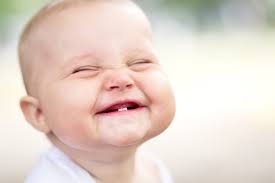When your baby’s teeth first start to come in, you may remember the eruption of every single tooth. As they get older, those memories blur a bit. You may look in your child’s mouth and wonder exactly which of those teeth are still their baby teeth.
Your dentist will have an easy time determining which teeth are permanent, and which will still be replaced with a permanent tooth. There are a few differences you can look for.
- Baby teeth are whiter in colour than permanent teeth
- Baby teeth are smoother than permanent teeth
- Permanent teeth have jagged edges called mamelons to help them break through the gums.
Another way to determine if your child’s teeth are baby teeth or their permanent teeth is to determine which teeth are due to be lost and erupt according to your child’s age and how many teeth they have.
Baby Teeth
A baby/child will have 20 teeth by the time they are 2-3 years old. Their bottom front teeth are usually the first to peek through. By the time they are three, your child will have:
| Four lateral incisors | upper erupt 9-13 months | lose 7-8 years |
| lower erupt 10-16 months | lose 7-8 years | |
| Four central incisors | upper erupt 8-12 months | lose 6-7 years |
| lower erupt 6-10 months | lose 6-7 years | |
| Four cuspids | upper erupt 16-22 months | lose 10-12 years |
| lower erupt 17-23 months | lose 9-12 years | |
| Four first molars | upper erupt 13-19 months | lose 9-11 years |
| lower erupt 14-18 months | lose 9-11 years | |
| Four second molars | upper erupt 25-33 months | lose 10-12 years |
| lower erupt 23-31 months | lose 10-12years |
Your child will also get eight more teeth (molars and cuspids), for a total of 28 teeth. While all permanent teeth should be erupted by the time your child is 12 years old, the wisdom teeth will make their appearance between 17 and 21 years; they will then have a total of 32 teeth.
Up until your child’s 13th birthday, they may have a combination of baby teeth and permanent teeth. So excellent care of those first teeth is important. You will want to have your child visit the dentist for the first time when they are one year old.
There are steps that parents should take to ensure the health of those baby teeth:
- Before your baby’s teeth first appear, wipe their gums with a clean washcloth twice a day
- After they get a tooth, you can begin using a soft child’s toothbrush with plain water
- When your baby is 18 months, you can begin using a pea-sized amount of toothpaste.
Your child should be ready to start brushing and flossing their teeth unsupervised when they are around seven years old. Your dentist will help you deep their teeth healthy and strong throughout their lives.
At Morrin Dental, Newcastle NSW, we are dedicated to providing quality dental care for you and your entire family. Contact Morrin Dental to keep your child’s teeth healthy from their first baby teeth through adulthood.
